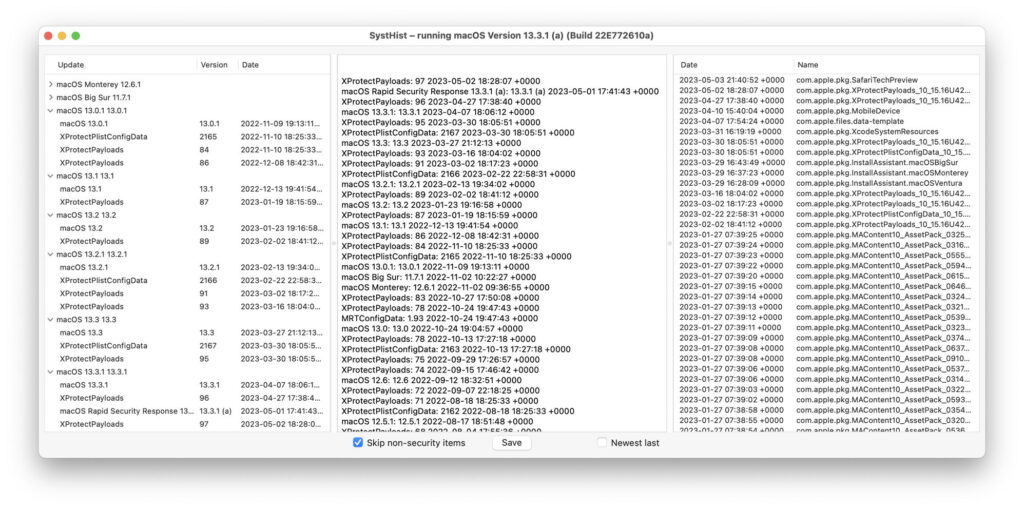Which version of SilentKnight and other apps do you need?

Every autumn/fall, the current version of macOS changes, and with it there are changes great and small that can affect the apps we run. If you use any of the free apps that I provide here, now is the time to check that you’re running the correct version to support both your current macOS, and any that you might aspire to in the coming months.
SilentKnight
Although most of my apps have auto-update mechanisms that inform you when their updates are available, there are some notable pitfalls that can lull you into a sense of false security. Most importantly, SilentKnight was upgraded to version 2 two years ago to ensure its compatibility with Catalina and later. Every few days I come across someone who is still using version 1 with a newer release of macOS and seeing incorrect results. If you use SilentKnight in any version of macOS from Catalina onwards, then please ensure that it’s updated to the current version 2.10:
SilentKnight 2.10 (Universal App for Catalina to Sequoia)
This is particularly important if you intend upgrading to Sequoia, because of the changes it brings in how XProtect is updated. If you’re still running 2.9 or earlier, then SilentKnight will give you incorrect versions for XProtect, and at worst could report a version of 0 (zero) as it might not be able to find XProtect at all.
Skint and SystHist
For the same reason, Skint should be updated to version 1.08:
Skint 1.08 (Universal App for Monterey, Ventura, Sonoma and Sequoia only)
SystHist lists full system and security update installation history, a task that invariably requires an annual update to cope with the quirks of the new version of macOS. If you’re aiming for Sequoia at some stage, ensure that you have updated it to version 1.20:
SystHist 1.20 (Universal App for High Sierra, Mojave, Catalina, Big Sur, Monterey, Ventura, Sonoma and Sequoia)
Writing Tools
Although Apple isn’t intending to release any of its new AI features in the initial version of Sequoia, 15.0, but is delaying them for 15.1, you might like to prepare for that by updating my rich text editor and PDF viewer in advance. Their latest versions should prove fully compatible with Writing Tools when they’re released.
DelightEd is a Rich Text (RTF) editor with special Dark Mode features and support for interlinear text, and version 2.3 should work fully with Writing Tools:
DelightEd 2.3 (Universal App for High Sierra, Mojave, Catalina, Big Sur, Monterey, Ventura, Sonoma and Sequoia)
Podofyllin is a lightweight PDF viewer (without any editing capability, so it can’t alter original PDF files) and shows source code and more. Version 1.3 should work fully with Writing Tools:
Podofyllin 1.3 (Universal App for High Sierra, Mojave, Catalina, Big Sur, Monterey, Ventura, Sonoma and Sequoia)
XProCheck, Nalaprop, Precize
Other recent updates you might have missed include the following.
XProCheck to check on XProtect Remediator scans completed and reported in the log:
XProCheck 1.6 (Universal App for Catalina, Big Sur, Monterey, Ventura, Sonoma and Sequoia)
Nalaprop for multilingual natural language parsing, now compatible with Writing Tools:
Nalaprop 1.3 (Universal App for Mojave, Catalina, Big Sur, Monterey, Ventura, Sonoma and Sequoia)
Precize, which looks deep into files, bundles and folders to show their full size including extended attributes, provides macOS Bookmarks and volfs paths as enduring file references, and detailed information contained in Bookmarks and Aliases:
Precize 1.15 (Universal App for High Sierra, Mojave, Catalina, Big Sur, Monterey, Ventura, Sonoma and Sequoia)
Key points
For Catalina or later, particularly Sequoia, use SilentKnight 2.10.
For Sequoia in particular, use Skint 1.08.
For Sequoia in particular, use SystHist 1.20.
Older versions of those apps will give incorrect results when run in more recent versions of macOS.




